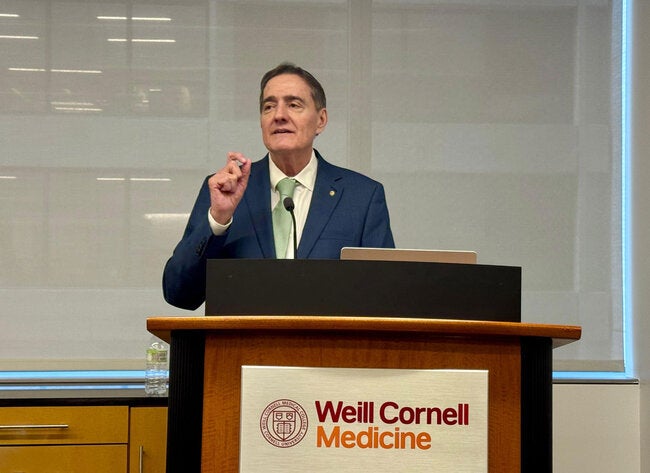New York, 22 September 2025 (PAHO) – The urgent need to address the interplay between infectious diseases and non-communicable diseases (NCDs), which together pose the greatest public health challenges in the Americas, was highlighted by Dr. Jarbas Barbosa, Director of the Pan American Health Organization (PAHO), at an event held on the sidelines of the 80th United Nations General Assembly.
Co-organized by the Mérieux Foundation, Weill Cornell Medical College, GHESKIO Centers, and PAHO, the session, Bridging the Divide: Non-Communicable and Infectious Diseases in a Changing Global Health Landscape, convened global health experts at Weill Cornell Medicine to explore integrated solutions for a healthier future.
“NCDs, principally cardiovascular diseases, cancer, diabetes, and chronic respiratory diseases, are the greatest public health challenges of our time,” Dr. Barbosa said. “In the Americas, they caused 6 million deaths in 2021—with 38% occurring prematurely in people under 70, during their most productive years.” He noted that over 240 million people in the region live with NCDs, requiring ongoing treatment and care.
Dr. Barbosa emphasized that lifestyle factors like sedentarism, ultraprocessed foods, obesity, tobacco use, air pollution, and rapid urbanization fuel this epidemic. He added that population aging is also a major driver of NCDs in the region. Yet, he stressed an often-overlooked factor: the bidirectional link between infectious diseases and NCDs, where each can exacerbate the other.
“We dramatically experienced the interplay between NCDs and infectious diseases during the COVID-19 pandemic, where people living with NCDs were more susceptible to infection and faced increased risk of severe disease and death,” he said. “Therefore, during the pandemic, PAHO prioritized the continuity of services for people with NCDs to ensure that comorbidities were adequately addressed with appropriate treatment,” he added.
A striking example is the relationship between diabetes and tuberculosis. “Each condition exacerbates the other, complicating both diagnosis and treatment,” Dr. Barbosa explained. “Diabetes increases susceptibility to tuberculosis and can lead to suboptimal treatment outcomes or heightened risk of drug resistance. Conversely, tuberculosis can impair glycemic control, trigger diabetes onset, or interfere with its management due to drug interactions,” he said. In high-burden areas like Peru, PAHO is working to facilitate early detection and appropriate management of both conditions, using global TB and comorbidities guidelines.
Cancers with infectious origins were also a focus. “Cervical cancer, affecting nearly 80,000 women annually in the Americas, is caused by persistent human papillomavirus (HPV) infection,” Dr. Barbosa said. “HPV is a sexually transmitted infection, and both HPV vaccination and testing are cost-effective ways to prevent cervical cancer. PAHO is helping countries scale up coverage to achieve the elimination targets of 90% HPV vaccination, 70% screening, and 90% treatment.”
Similarly, liver cancer, linked to hepatitis B and C, is being addressed as part of PAHO’s comprehensive immunization program. The Organization works with governments and civil society to vaccinate newborns against hepatitis B within 24 hours of birth and to promote treatment for both hepatitis B and C to help prevent liver cancer.
Emerging science points to the gut microbiome’s role in NCDs like obesity, diabetes, and cardiovascular diseases. “Growing research shows that the gut microbiome, including bacterial genomes, plays a role in conditions such as obesity, diabetes, cardiovascular diseases, immune disorders, and cancers,” Dr. Barbosa noted. “The NCD burden tied to infectious causes is likely to grow as we learn more about microbiota.”
He also highlighted that social determinants, such as poverty and inequity, drive both infectious diseases like HIV, tuberculosis, and hepatitis, and NCDs. “Addressing social determinants—such as poverty and inequity—is not just vital for preventing infectious diseases, but also forms a foundational pillar of any effective NCD response,” he said.
To move from dialogue to action, Dr. Barbosa called on countries to strengthen integrated health approaches that bridge infectious and non-communicable diseases. He urged governments and partners to prioritize early detection of comorbidities, maintain continuity of care during emergencies, scale up cost-effective interventions like HPV and hepatitis B vaccination, and address social and economic inequalities that shape health outcomes. These steps, he emphasized, are essential for building more resilient, inclusive, and sustainable health systems.
